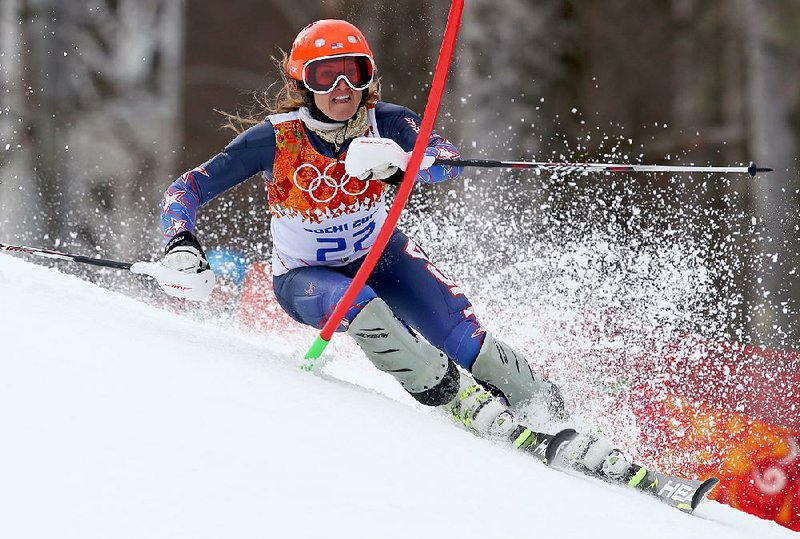KRASNAYA POLYANA, Russia - In Alpine skiing, there are speed specialists and there are technical specialists, and then there’s Maria Hoefl-Riesch.
As versatile as they come, the German is establishing herself as one of the very best ever - and she owns three Olympic golds to prove it.
Solid in Monday morning’s downhill run, then muchmore special in the afternoon’s slalom, Hoefl-Riesch won the super-combined for the second Winter Games in a row.
Her total time of 2 minutes, 34.62 sec-Hoefl-Rieschonds was 0.40 seconds faster than silver medalist Nicole Hosp of Austria. Hoefl-Riesch was 0.53 better than first-run leader Julia Mancuso, whose bronze was her fourth career Olympic medal in Alpine skiing, twice as many as any other U.S. woman has won.
“Of course, the expectations were really high for today. I was one of the top favorites - or, actually, the top favorite,” Hoefl-Riesch said. “The pressure was really high. I tried to keep cool and easy. … Yeah, you can say that, but it’s not always possible.”
For her, it seems, anything is possible, particularly when it matters most.
This was the sixth Olympic race for Hoefl-Riesch - there’s been talk that she could retire after the season - and she’s finished inside the top 10 in each one. She missed the 2006 Turin Games after tearing ligaments in both knees the year before, then started making up for that lost opportunity with victories in Vancouver four years ago in the super-combined and slalom. She also is a five-time world championship medalist, won the 2011 overall World Cup title and leads the current standings.
“She won everything,” said Hans Pum, Austria’s Alpine director. “She’s now one of the greatest.”
Only one woman has won four Alpine Olympic golds, Janica Kostelic of Croatia, and Hoefl-Riesch, 29, could match that as soon as Wednesday, in the downhill, when she’s sure to be tested by Mancuso again.
SHORT-TRACK SPEEDSKATING
Canada’s Hamelin wins
The Hamelin family of Canada got the Olympic short track competition off to a winning start.
Charles Hamelin skated clear of the chaos that makes short track so unpredictable, winning the 1,500 meters on Monday for his third different Olympic title.
At 29, Hamelin was the oldest skater in the final. The wily veteran maintained a top-three position throughout most of the 14-lap race, leaving enough at the end to defeat a loaded field.
Hamelin raised his arms in triumph after crossing the finish line at the Iceberg Skating Palace. He pumped his right arm through the turn and went hard into the pads to first embrace his coach and then his father Yves, the team leader for Canada.
Hamelin will have two more chances to win individual gold in the 500 and 1,000, and he’ll be part of Canada’s team in the 5,000 relay.
Han Tianyu of China took silver. Viktor Ahn of Russia earned the bronze, giving his adopted country its first-ever short track medal. American J.R. Celski, the 2010 bronze medalist from Federal Way, Wash., finished fourth.
Ahn was a three-time gold medalist for his native South Korea, changed his name and became a Russian citizen. He was known as Ahn Hyun-soo when he won gold in the 1,500 at the 2006 Turin Olympics.
SPEEDSKATING
Dutch sweep in 500
Michel Mulder led another sweep by the Netherlands at Adler Arena, edging teammate Jan Smeekens by 12-thousanths of a second. Mulder’s identical twin brother, Ronald, got the bronze.
It was the first gold medal in the men’s 500 for the Netherlands, which also became the first country to take the top three Olympic spots in the sport’s most furious race.
Smeekens led after the first of two heats and the scoreboard initially showed a tie after he crossed the line in the second leg, based on hundredths of a second. After a bit more tabulating, Mulder had the gold with a total of 1 minute, 9.312 seconds - carried out to the thousandths of a second in the official results to show just how close it was.
The silver went to Smeekens in 1:09.324, while Ronald Mulder grabbed the bronze with the fastest run of the day, 34.49 in the second round to finish at 1:09.46.
BIATHLON
Fourcade dominates
With 2.5 kilometers still to ski, Martin Fourcade was feeling so strong he started celebrating his first Olympic gold medal.
Having hit all five targets in his final round of shooting, the Frenchman stretched his arm in the air and pumped his fist.
Minutes later, Fourcade crossed the finish line at a leisurely pace to confirm what he already knew - he had won gold in the men’s 12.5K pursuit at the Sochi Olympics.
Fourcade’s friend and teammate, Jean Guillaume Beatrix, earned bronze, and both put France onto the medals table at the Sochi Games.
Fourcade missed one target in the standing shooting portion of the race, which he finished in 33 minutes, 48.6 seconds. Ondrej Moravec of Czech Republic finished 14.1 seconds later to take silver, and Beatrix was 24.2 seconds behind Fourcade in third.
CURLING
Norway beats U.S.
The Norwegian men, curling’s fashion kings of cool, made their Sochi debut with another snazzy pattern on their pants - a mixture of red, white, blue and gray squares and rectangles.
Norway beat the U.S. 7-4, but the surprise of opening day was Switzerland’s 5-4 upset of defending champion Canada.
On the women’s side, Sweden defeated Britain 6-4 in a matchup of two favorites for the women’s curling gold.
Sports, Pages 18 on 02/11/2014

